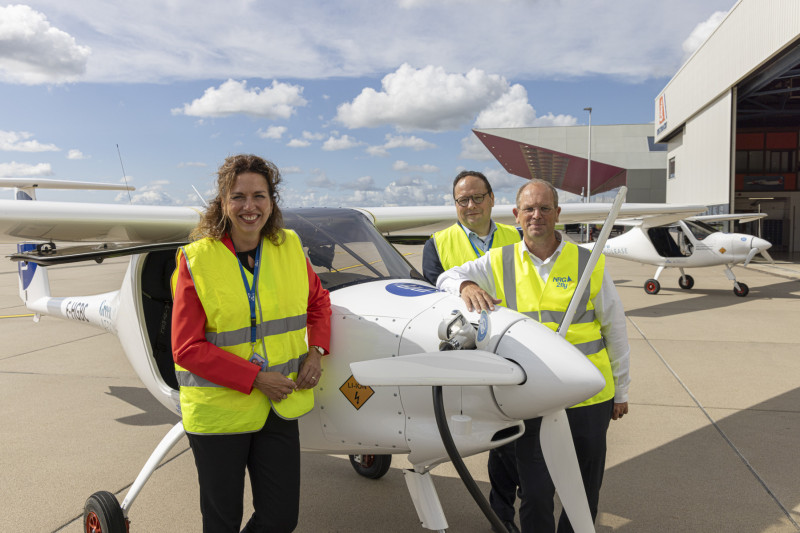
KLM Collaborates with Electric Flying Connection for Unique Electric Flight Experience, Gaining Insights into Sustainable Aviation Logistics
Amstelveen, Netherlands, 2023-Sep-01 — /Travel PR News/ — On 28 and 29 August, KLM Royal Dutch Airlines and the trade association Electric Flying Connection (EFC) offered a group of KLM guests a unique opportunity to experience the future of flying. The eighteen guests received a trial electric flying lesson aboard a Pipistrel Velis Electro, supervised by instructors from the E-Flight Academy. The 18 training flights, which operated between Lelystad Airport and Schiphol-Oost over the course of two days, offered KLM unique insight into the entire system of electric flight logistics and the challenges it presents. “To make air transport more sustainable, we have to test new technologies and innovations in practice. The things we do today on a small scale with the resources we have now, may prove to be important drivers of scalability in these applications in the future,” said Jolanda Stevens, program manager for Zero Emission Aviation at KLM.
This initiative came from the Electric Flying Connection (EFC) in collaboration with instructors from E-Flight Academy. “This unique event aims to give all relevant stakeholders an opportunity to experience electric flight and what this innovation could mean for them in practical terms. We are pleased that KLM has joined us in taking this step. We already have plans for future, Benelux-wide editions of this event,” said Jurjen de Jong, chairman of EFC.
Schiphol was a logical starting point because it is KLM’s home base. As the range of the Pipistrel is limited, only four destination airports were possible options. Lelystad Airport was chosen because it is easily accessible, with excellent recharging facilities, top-notch runways, and a fully functioning air traffic control centre.
Insight into logistics and infrastructure
KLM has partnered with EFC and the E-Flight Academy to acquire knowledge about electric flight and to ascertain what impact this technology will have on KLM’s logistics and infrastructure needs. Jolanda Stevens: “Electric flight will also affect flight handling. Electric aircraft have to be recharged, which takes time, and we will need to cooperate with Amsterdam Airport Schiphol and Air Traffic Control the Netherlands to ensure that this mode of flying is not only safe, but also provided with the correct power supply. This two-day event has helped us gain more insight into such matters.”
Zero Emission Aviation: backing various technologies simultaneously
The Pipistrel Velis Electro is the world’s first and only certified electric aircraft. The two-seater plane has a flight range of 50 minutes (plus 10 minutes reserve). This means it will not play a part in serving KLM’s network of destinations. However, KLM is researching how electric flight may be incorporated into future operations. Various market experts predict that by 2035 there may be an electric aircraft that can carry 50 to 100 passengers, with a range of 90 minutes (i.e. 400-750 kilometres). The batteries required for such flights are heavy, which is why it would be unrealistic to develop larger aircraft for longer routes, such as between Amsterdam and New York. Stevens: “Looking at the future of zero-emission flights, KLM is backing different technologies and innovations simultaneously. With our sector partners at home and abroad, we’re researching flights powered by electricity, hydrogen and hybrid forms, and assessing how these developments can be accelerated.”
KLM’s climate strategy
The responsibilities attached to operating an airline are immense. To reduce our impact on the environment, we need to ensure that future operations are cleaner, quieter, and more fuel-efficient. The route to Zero Emission Aviation is an essential element of our climate strategy. A great deal of work still needs to be done to ensure the success of new technologies, with every piece of the puzzle falling into place. This includes new aircraft, different infrastructure, changes to the way airspace is used, adjustments to airline operations, and, at the heart of it all, the availability of green energy. Intensive cooperation between the players in the value chain is vital, making this an interesting journey with many obstacles and uncertainties. Nevertheless, KLM is doing its utmost to reduce CO2 emissions with measures that are currently available, which include upscaling the production and use of sustainable aviation fuel and reducing fuel consumption through fleet renewal and increased operational efficiency. We must also continue to improve the integration of different modes of transport, such as air-rail.
About the Electric Flying Connection
The Electric Flying Connection (EFC) is a trade association for electric flight and already has more than 50 members, representing a wide array of companies in the electric flight ecosystem, including airlines (such as KLM), manufacturers of electric aircraft, and aircraft components, flight academies, organizations developing recharging infrastructure, airports and more. The main objective of the EFC is to forge connections between the right, relevant players within the value chain, with a view to advancing the sustainability of air transport.
Media Contact:
Email: mediarelations@klm.
Source: KLM
###
